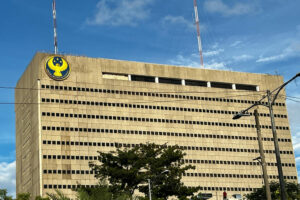YIELDS on the central bank’s term deposits dropped further on Wednesday amid expectations of further rate cuts by the Bangko Sentral ng Pilipinas (BSP).
The BSP’s term deposit facility (TDF) fetched bids amounting to P319.353 billion on Wednesday, above the P240 billion placed on the auction block but slightly lower than the P339.78 billion in bids seen for the P180-billion offer a week ago.
Broken down, tenders for the seven-day papers reached P189.095 billion, higher than the P140 billion auctioned off by the central bank but lower than the P213.661 billion in bids recorded for the P100-billion offer the previous week.
Banks asked for yields ranging from 5.725% to 5.825%, narrower than the 5.715% to 5.8745% band seen a week ago. This caused the average rate of the one-week deposits to decline by 2.1 basis points (bps) to 5.7983% from 5.8193% previously.
Meanwhile, bids for the 15-day term deposits amounted to P130.258 billion, above the P100-billion offering and the P126.119 billion in tenders for the P80 billion in 14-day papers placed on the auction block on Jan. 8.
The two-week tenor offered this week was adjusted from the usual 14-day maturity due to a holiday.
Accepted rates for the tenor were from 5.75% to 5.91%, lower than the 5.84% to 5.97% margin seen a week ago. With this, the average rate for the two-week deposits dropped by 6.44 bps to 5.8675% from 5.9319% recorded in the prior auction.
The BSP has not auctioned 28-day term deposits for more than four years to give way to its weekly offerings of securities with the same tenor.
The term deposits and the BSP bills are used by the central bank to mop up excess liquidity in the financial system and to better guide market rates.
Term deposit yields went down amid expectations of further policy easing by the BSP, Rizal Commercial Banking Corp. Chief Economist Michael L. Ricafort said in a Viber message.
BSP Governor Eli M. Remolona, Jr. last week said the central bank still has room to continue cutting interest rates as inflation remains manageable, adding that current benchmark borrowing costs remain “restrictive.”
Headline inflation picked up to 2.9% in December from 2.5% in November, the government reported last week. Still, this was slower than the 3.9% print in the same month in 2023 and was within the 2.3%-3.1% forecast of the BSP.
The December rate brought the full-year 2024 inflation average to 3.2%, slower than 6% in 2023 and marking the first time since 2021 that the consumer price index settled within the BSP’s 2-4% annual target.
The Monetary Board has slashed benchmark borrowing costs by a total of 75 bps since it began its easing cycle in August, bringing its policy rate to 5.75%.
Mr. Remolona previously said that while the BSP remains in an easing cycle, 100 bps worth of cuts this year may be “too much” amid inflation concerns. He added that they will continue to bring down benchmark interest rates in “baby steps.”
The Monetary Board will hold its first rate-setting meeting for this year on Feb. 20.
“The BSP TDF average auction yields also declined after the initial implementation of the maximum suggested retail price (MSRP) for imported rice (that) could further support benign inflation,” Mr. Ricafort said.
The Agriculture department had set the MSRP at P58 per kilogram for imported rice with broken-grain content of 5%.
A price ceiling has not yet been set for imported 25% broken rice. The price ceiling is expected to take effect on Jan. 20, initially in Metro Manila. — L.M.J.C. Jocson
